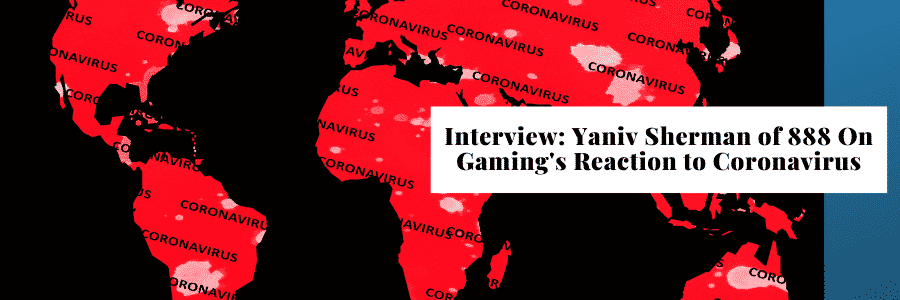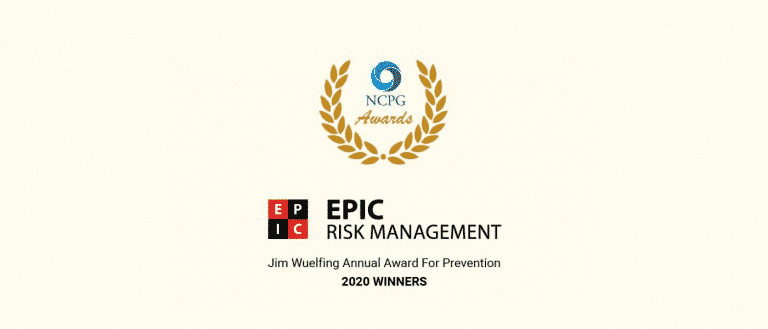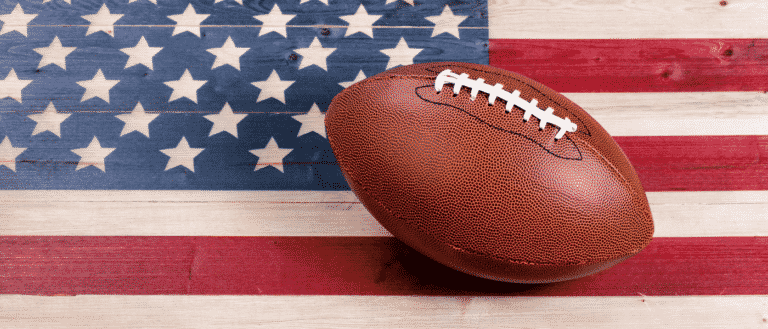Interview: 888’s Yaniv Sherman Talks Coronavirus Gambling Impact

Coronavirus has altered or effectively halted nearly every industry in all corners of the world. Legal gaming has been especially devastated. As casino floors and hotel rooms sit vacant, Americans have shifted their attention to online casinos and poker rooms in the handful of states with regulated online poker.
Yaniv Sherman, a gambling and sports betting expert and Head of Commercial Development at 888 Holdings, spoke with BettingUSA about the impact of the virus, how it is impacting the way people play online poker and what may come next for his company and the multi-billion dollar industry overall.
The coronavirus outbreak has touched nearly every aspect the global economy. How has it impacted gaming in particular?
Everything is pretty much grinding to a halt. For retail gaming in general, the bottom line is that everything is on hiatus. The big companies are looking at massive furloughs to the workforce.
As for online gaming, it’s looking at an interesting situation, an unprecedented one. We at 888 do online sports betting, casino and poker, with a big sports betting business in particular. We came into this year off a strong 2019 and 2020 began well, and then sometime in March, the COVID-19 situation started making an impact.
Still, our online gaming metrics are trending well. People are quarantined, playing more. But our biggest vertical in the world is sports, and the lack of sporting events, it is hurting every business. We are able to mitigate things because we are purely digital and we have a full suite of products. Our diversification across markets and across products has served as effective mitigation.
Looking down the line, if the world, and it seems to be the case, is heading to a global recession, the lack of disposable income will impact everybody. Land-based sports content providers, sportsbooks, and gaming companies will be hit first and hardest. At this point, we’re just making sure we’re agile and prepared for any eventuality.
Since every commercial casino in America is closed, and with it, state tax dollars, could this help sway lawmakers to support expanded online gaming legislation?
I think the biggest challenge there is to explain to people that gaming in the U.S., Nevada is the exception, not the rule. In most cases, gaming has been proliferated on the condition that it moved away from population centers.
Having people register in person at stateside gaming facilities, if you’re looking at the numbers coming down these days from Iowa or New York and then comparing with the numbers coming out of New Jersey, Indiana, and Pennsylvania, that jumps at you. The fact is that the growth comes from mobile, and mobile needs to be effective. People today just don’t drive out 45 minutes each way to open an account or fund it. The only ones making money there are the offshore bookies.
Rhode Island and Oregon are examples of the other model, where a local lottery is monopolizing gaming. That’s what the customers will get in terms of product quality and competition. The state, they don’t seem to understand that competition is not a bad thing. If anything, online gaming has demonstrated that it never cannibalizes from land-based players. State lotteries are very concerned it’ll cannibalize their business but at the end of the day, the state’s agenda is collecting tax revenues. I think New Jersey and Pennsylvania are the two prime examples of how to do it better.
Online poker has been an afterthought for some operators in the U.S., especially since the Supreme Court struck down the federal wagering ban (known as “PASPA”) in May 2018. Why has 888 stuck with poker?
Just before PASPA was repealed, we launched our interstate poker network. Immediately we saw an uptick. There were poker players looking for a product and liquidity. The quarantine situation has emphasized growth. We see a surge in the activity of people rediscovering the game because they can meet new friends as well as set up private tournaments.
For us, there’s another benefit because there’s also less competition, as there are fewer operators around poker that are in a position to monetize on it. It’s extra important because it gives another product to offer. Not just because there are no sports right now, but when you want to give players the option to play, you want to offer them as many products as you can. It also makes it more efficient because poker player recruitment is traditionally more cost-effective than iCasino in some cases.
So we definitely need poker. We’re seeing sort of a short-term renaissance. If anything, we’ve demonstrated that there’s a lot of value to poker. It also won’t cannibalize anything. It doesn’t threaten any other gaming option. It gives players another product they can play legally. It means they won’t play in an offshore poker room that doesn’t guarantee their money and doesn’t take care of the players.
With increased play means increased risk for problem gaming. What has 888 done to assure responsible game play?
Globally, we have very much reinforced our responsible gaming measures and safe gaming measures since the situation started developing. On the other side of the increased play, we know that means they’re indoors and playing for a long amount of time. So we’re taking extra measures to make sure that they continue playing responsibly and we don’t exploit the situation by any means. People should not play outside their means, even if they’re looking to play longer. This a very important aspect of the operation.
How has this changed the way people play poker?
People are now opening our tables and playing for cash through our platform with Zoom in the background so they can see their friends. We had a play with friends video poker product that you could play with friends since 2015. Back then the demand wasn’t that good. The video was kind of sketchy and people were just looking to play the game. Pace of play was more important because they still had their neighborhood poker games they were playing with friends.
Now, five years later, everybody wants to do video poker and act with a poker face and all that. Now we see a lot of success with that product. We were slightly ahead of our time.
How will COVID-19 impact the global gaming market as a whole?
At the end of the day, anything that happens in our games will be on the shoulders of the bigger macro situation. It is pretty apparent that this will last longer than people had hoped. It will take longer to pull out of it. But I definitely think on the other side, lawmakers will be looking for alternative revenue channels.
We’re already seeing that some started dabbling with online gaming, and maybe expanding sports betting in some states to iGaming and poker to get more tax dollars through the state-regulated fashion. Having said that, it’ll take time. I think the legislators will be focused, and so should they be, on the basic health of their states, as well as a high rate of unemployment to deal with. I think overall people will be more receptive to these games.
The most important component is the actions of the land-based companies because they’ve now realized how vulnerable they may be in a very capital-intensive, margin-sensitive business. So I think that we’ll get more traction there, but this will ride on the coattails of whatever is done on the state and federal levels.
From every perspective, I hope that we go back to normal, but our industry coming out the other side, globally and in the U.S., will come out differently. Some companies will have to go through restructuring or go out of business entirely. It’s a sad outcome of this situation. Legislatures will have to huddle up and decide if they want to push this aggressively.
What about for 888 specifically?
We have made sure that we kept a clean bill of health in terms of regulation. So when we are able to enjoy and expand our existing licenses we are well-positioned to do that. Getting a new player or a new entrance to a market will still be very hard for the incumbents that are able to survive this and come up the other side with a robust business.
But we are well-positioned. That’s why we’re trying to make sure that every resource is focused on delivery and that we’re agile and nimble. We have a very flexible cost structure and once we’re able to move on to the other side, we’ll be able to move forward based on whatever we’re presented with.
Ryan Butler is a legislation analyst for BettingUSA.com specializing in US sports betting legislation. Ryan breaks down the latest bills in each state to ensure our readers are up-to-date on where their states sit on sports betting. You’ll often find Ryan listening to committee hearings or preparing for the latest legislation based conference.







